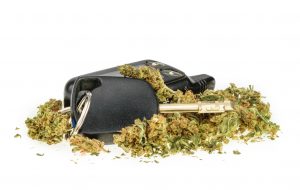 The national trend toward marijuana legalization results in more drivers with THC in their systems. Law enforcement agencies currently test for THC at a laboratory after a driver is arrested for DUI (called ‘OVI’ in Ohio). Law enforcement desires to use a device to test for THC before a driver is arrested, and the instruments used in crime labs are much too large to be used in the field. That creates a market for companies to manufacture roadside THC testers. Some states have experimented with on-the-scene devices, and we expect to see more in the near future.
The national trend toward marijuana legalization results in more drivers with THC in their systems. Law enforcement agencies currently test for THC at a laboratory after a driver is arrested for DUI (called ‘OVI’ in Ohio). Law enforcement desires to use a device to test for THC before a driver is arrested, and the instruments used in crime labs are much too large to be used in the field. That creates a market for companies to manufacture roadside THC testers. Some states have experimented with on-the-scene devices, and we expect to see more in the near future.
The Need for TCH Testing
One year ago, there were ten states which completely prohibited marijuana possession and/or consumption. That number is now two. Currently, 34 states have medical marijuana programs, and 14 states permit recreational marijuana use. Consequently, there are more drivers on the road who use marijuana.
Marijuana’s psychoactive compound, THC, is known to have behavioral effects which may impair driving ability. Those effects include euphoria, relaxation, altered time perception, and lack of concentration. To address the problem of driving while high, all states have laws which prohibit driving under the influence of marijuana. Officers are trained to detect and test for impaired driving, and governments would like the officers to have a tool which assists officers with determining whether a person is under the influence of THC.
The Market for Roadside THC Testing
That tool is the roadside THC tester. The governments’ desire for roadside THC testing created a market for manufacturers to sell devices to law enforcement agencies. Four manufacturers have created devices which are designed to help the officers make correct arrest decisions. Those devices are currently used in about ten states and are being marketed to law enforcement agencies throughout the nation.
Current Roadside THC Testers
The four devices currently in use are: (1) Drug Test 5000 (Drager); (2) So Toxa Mobile Test System (Abbot); (3) Drug Wipe S (Alcohol Countermeasure Systems); and (4) The Device (mLife). All four instruments test for the presence of THC in a subject’s oral fluid using an immunoassay technique.
The current roadside THC testers lack reliability. First, they test only the presence of THC and not the quantity of THC. Second, they may detect THC which has been in the driver’s oral fluid for up to 78 hours; long after the psychoactive effects of the THC are gone. Third, there is no correlation between oral fluid THC and blood THC, and it is blood THC which produces behavioral effects. The lacking reliability was acknowledged by the National Highway Traffic Safety Administration in its 2017 publication, ‘Marijuana-Impaired Driving: A Report to Congress.
The Road Ahead
Despite the current reliability issues with roadside THC testers, we can anticipate their use will increase. These devices are similar to portable breath testers (PBTs), which also face reliability challenges. Despite their questionable reliability, the use of PBTs became widespread. The same can be expected with roadside THC testers. It is important for DUI lawyers to challenge the use of roadside THC testing. It is equally important for individuals charged with Marijuana DUI to find lawyers with expertise in this area.
About the Author: Shawn Dominy is a leading DUI lawyer in Ohio and the founder of the Dominy Law Firm in Columbus, Ohio. He can be reached through his law firm’s website: Dominy Law Firm.